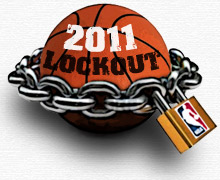Re: NEWS ONLY Lockout thread
http://ken-berger.blogs.cbssports.co...38893/33072825
http://ken-berger.blogs.cbssports.co...38893/33072825
Three items that could break the BRI logjam
Posted on: November 1, 2011 2:43 pm
by Ken Berger
As explained expertly by SI.com and the New York Times in recent days, much progress has been made on system issues that are crucial to a new collective bargaining agreement. But there are several subsets of deal points still unresolved, and many so-called "B-list" items that haven't even been broached yet.
It's within those issues that compromise finally will have to be reached to push the two sides closer together on the biggest sticking point: the split of basketball-related income (BRI).
The owners are dug in with their offer of a 50-50 split, while the players aren't budging lower than 52 percent. But not all 50-50 deals are created equal, and the key to breaking the revenue logjam will be tradeoffs that have to be made on the remaining open system issues.
There are three key issues that could be tweaked to entice the union to compromise further on BRI and/or compel the owners to move from their 50-50 position. They are as follows:
1) The punitive entry point for small- or mid-market teams considering "wading into" the luxury tax temporarily, which the union refers to as "the cliff." The obvious solution would be for the distribution of luxury tax money to be changed to eliminate the double-whammy teams experience by going from being a tax receivers to tax payers. Such a whiplash effect, in some cases, triples the cost of going for it with a modest move into the tax. For example, a team that is just below the tax adding a $2.5 million player results in a net cost of $7.5 million -- the cost of the player, the loss of $2.5 million in tax revenue from tax-paying teams, and the cost of the $2.5 million in tax that team would have to pay. Rather than a straight transfer of tax money from tax payers to non-tax payers, distributing the money as a revenue-sharing transfer based on need -- or using it for another purpose -- would flatten out the cliff and move the two sides closer to compromise.
2) The ability of tax-paying teams to use exceptions such as the Bird and mid-level exceptions. The players don't want tax-paying teams, which typically are big-market and/or high-revenue teams, eliminated from the pursuit of free agents through restrictions on their willingness or ability to spend that act like a hard cap. Owners have reluctantly agreed to leave the Bird and mid-level exceptions intact, albeit with shorter contract lengths. But the owners are digging in with their insistence on forbidding tax-paying teams from using these exceptions, which to the players means a smaller market for free agents.
3) Severe penalties for repeat offenders who spend multiple years over the tax threshold. While the owners' proposal for recidivism tax rates would accomplish their goal of reining in the big spenders, the players have been unwilling to accept restrictions that would further shrink the options for free agents in a system that, even as previously constructed, typically only had a handful of teams with cap space or the ability to blow through the tax threshold in a given year.
There are any number of small-ticket items still undecided that could be used for what the negotiators call "horse-trading" to close the gap on BRI. As I've suggested previously, one of them is increasing the players' share of licensing money -- which would have a net-zero affect on BRI since those funds already come off the top before the balance is split with the players -- and changing how that money is distributed so stars who sell a lot of jerseys and merchandise get a bigger share of the pie. Another item would be deal length and opt-out clauses; the players will accept a 10-year CBA only if they can opt out after the sixth and eighth years, while the owners want an opt-out after the seventh year.
But the aforementioned items are the Big Three of what's left to negotiate. It's pretty simple, really, from a bargaining standpoint. More player-friendly agreements on those three items may allow union chief Billy Hunter and president Derek Fisher to be able to sell less than 52 percent to the union membership. More owner-friendly agreements would require the owners to move off their 50-50 split. Something in the middle -- a little give, a little take -- could result in a range of percentages for the players' share of BRI. For example, if revenues come in as expected (4.5 percent growth), the players would get 50 percent. If revenues came in higher, they'd get 51 or 52, depending on how much growth there was. The scale could be tweaked based on the compromises made on the three A-list items.
"A very reasonable suggestion," one official involved in the negotiations told me.
There will be a time for reason, eventually. It's just that both sides need to understand how to get from here to there.
Posted on: November 1, 2011 2:43 pm
by Ken Berger
As explained expertly by SI.com and the New York Times in recent days, much progress has been made on system issues that are crucial to a new collective bargaining agreement. But there are several subsets of deal points still unresolved, and many so-called "B-list" items that haven't even been broached yet.
It's within those issues that compromise finally will have to be reached to push the two sides closer together on the biggest sticking point: the split of basketball-related income (BRI).
The owners are dug in with their offer of a 50-50 split, while the players aren't budging lower than 52 percent. But not all 50-50 deals are created equal, and the key to breaking the revenue logjam will be tradeoffs that have to be made on the remaining open system issues.
There are three key issues that could be tweaked to entice the union to compromise further on BRI and/or compel the owners to move from their 50-50 position. They are as follows:
1) The punitive entry point for small- or mid-market teams considering "wading into" the luxury tax temporarily, which the union refers to as "the cliff." The obvious solution would be for the distribution of luxury tax money to be changed to eliminate the double-whammy teams experience by going from being a tax receivers to tax payers. Such a whiplash effect, in some cases, triples the cost of going for it with a modest move into the tax. For example, a team that is just below the tax adding a $2.5 million player results in a net cost of $7.5 million -- the cost of the player, the loss of $2.5 million in tax revenue from tax-paying teams, and the cost of the $2.5 million in tax that team would have to pay. Rather than a straight transfer of tax money from tax payers to non-tax payers, distributing the money as a revenue-sharing transfer based on need -- or using it for another purpose -- would flatten out the cliff and move the two sides closer to compromise.
2) The ability of tax-paying teams to use exceptions such as the Bird and mid-level exceptions. The players don't want tax-paying teams, which typically are big-market and/or high-revenue teams, eliminated from the pursuit of free agents through restrictions on their willingness or ability to spend that act like a hard cap. Owners have reluctantly agreed to leave the Bird and mid-level exceptions intact, albeit with shorter contract lengths. But the owners are digging in with their insistence on forbidding tax-paying teams from using these exceptions, which to the players means a smaller market for free agents.
3) Severe penalties for repeat offenders who spend multiple years over the tax threshold. While the owners' proposal for recidivism tax rates would accomplish their goal of reining in the big spenders, the players have been unwilling to accept restrictions that would further shrink the options for free agents in a system that, even as previously constructed, typically only had a handful of teams with cap space or the ability to blow through the tax threshold in a given year.
There are any number of small-ticket items still undecided that could be used for what the negotiators call "horse-trading" to close the gap on BRI. As I've suggested previously, one of them is increasing the players' share of licensing money -- which would have a net-zero affect on BRI since those funds already come off the top before the balance is split with the players -- and changing how that money is distributed so stars who sell a lot of jerseys and merchandise get a bigger share of the pie. Another item would be deal length and opt-out clauses; the players will accept a 10-year CBA only if they can opt out after the sixth and eighth years, while the owners want an opt-out after the seventh year.
But the aforementioned items are the Big Three of what's left to negotiate. It's pretty simple, really, from a bargaining standpoint. More player-friendly agreements on those three items may allow union chief Billy Hunter and president Derek Fisher to be able to sell less than 52 percent to the union membership. More owner-friendly agreements would require the owners to move off their 50-50 split. Something in the middle -- a little give, a little take -- could result in a range of percentages for the players' share of BRI. For example, if revenues come in as expected (4.5 percent growth), the players would get 50 percent. If revenues came in higher, they'd get 51 or 52, depending on how much growth there was. The scale could be tweaked based on the compromises made on the three A-list items.
"A very reasonable suggestion," one official involved in the negotiations told me.
There will be a time for reason, eventually. It's just that both sides need to understand how to get from here to there.
 / laugh at PosterX / GroupOfPeopleY who thought / believed *insert though/belief here*"
/ laugh at PosterX / GroupOfPeopleY who thought / believed *insert though/belief here*"




Comment